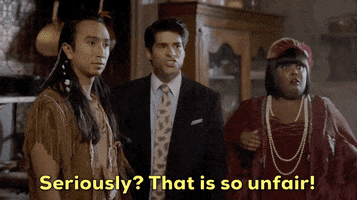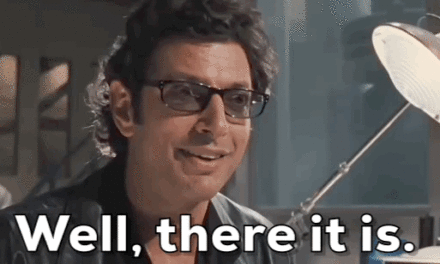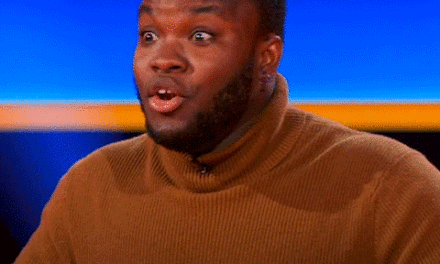We support our Publishers and Content Creators. You can view this story on their website by CLICKING HERE.
In its effort to address the question raised in the headline, “Why So Many People Are Going ‘No Contact’ with Their Parents” The New Yorker misses the target so badly it would be like aiming for the side of your barn and hitting the neighbor’s irrigator instead.
Right from the beginning, the piece employs the left’s favorite rhetorical trick of wickedwashing in which the horrible is made palatable by substituting purely descriptive language with something more positive-sounding or at least anodyne. Think “gender affirming care” instead of “child genital mutilation,” “undocumented immigrants” instead of “illegal aliens,” and “hi, honey, don’t worry, I already called the insurance company,” instead of, “hi honey, I wrecked the car.”
“Going no contact” sounds like an iPhone setting. That can’t be too bad, right? Certainly doesn’t conjure up images of a broken-hearted mother clutching a picture from her daughter’s high school graduation, the daughter she loved and cared and sacrificed for and who never wants to see or hear from her again.
But, hey, that’s just collateral damage.
At least the subheadline gets down to business:
A growing movement wants to destigmatize severing ties.
The obvious question here is why would anyone want to destigmatize something inherently awful, destructive, and painful for everyone involved?
This is not a skin condition we’re talking about, and as the article belatedly makes clear later, this has nothing to do with violent alcoholic mothers nor sexually abusive fathers. No, this involves something far more objectionable to the leftist mindset:
Parents with different opinions than theirs!
Author Anna Russell tries to appear to be fair, and might even be sincere given she appears to run with a crowd for whom self-awareness is not held in particularly high regard, but her manipulation and leanings are clear. Sure, she tosses a few nods toward objectivity such as how she “sometimes found [her] allegiances shifting,” (that is, shifting towards the parents on occasion) and the throwaway subheadline of the piece expressing potential concern about “a worrisome change in family relations,” which itself is quite the rhetorical feint. Severing ties with your parents is not a worrisome trend in family relations. This is not a Dear Abby letter about handing a difficult in-law. Aside from those and a few quotes from people who think it’s better to preserve your relationship with your family, it is an exercise in affirming those who find differences of opinion intolerable.
At this point, you’ve probably already figured out who the principal antagonist of Russell’s Marxist morality play is going to be, possibly halfway through reading the headline. It is the perennial favorite leftist boogeyman, the monster in the closet of their fevered nightmares, the equivalent of garlic to a vampire, honesty to a politician, and a hair conditioner to a feminist:
The Christian family.
Families are bad enough, operating as they do as independent power centers not completely under the control of the state, but are made much worse when they serve as a source of moral guidance and education, and thus an alternative to the state’s preferred narrative.
Families, and Christian families in particular, are the zig to their zag. While the state wants to offer universal “free” preschool, the better to start the inculcation early, Christian parents are increasingly turning to alternatives including homeschooling. When the state attempted to sexualize kids at ever-earlier ages, it was families who turned out in force at school board meetings to say “no.”
For the most part, the piece focuses on “Amy” and her growing disillusion with her family, including parents and siblings. The choice of Amy to be the protagonist was telling and betrays the lack of self-awareness I had mentioned earlier, because she is so perfect a caricature you’d think she was plucked out of a Babylon Bee article.
Amy, the eldest of five siblings, was homeschooled by evangelical parents in the suburbs of Alberta, Canada.
All the red flags are there. Homeshooled! Evangelical parents! Canadian!
I’m joking about Canada (viewed by leftists more as a role model than a cautionary tale) but it is telling that Russell was willing to go to another country to find her perfect antagonist with which to set the stage for family dissolution.
She was bright, and happy, and remembers days spent reading “David Copperfield” aloud with her siblings.
She was bright! She was happy! She read books aloud with her siblings, quite possibly also bright and happy!
What happened? This is where Russell misses that side-of-the-barn target (all emphases mine).
It was only when she left for college — Ambrose University, a Christian liberal-arts school — that aspects of her childhood began to strike her as peculiar.
She becomes miserable “only when she left for college.” Russell never draws that straight line, not once, not for a moment, suggesting that perhaps her liberal arts college did her a grave disservice in ways she appears thoroughly incurious about. In fact, it appears she believes the fact that it was a “Christian” liberal arts school in some way inoculates it from any criticism. It was Christian after all! It’s probably in part why she wanted to use Amy as an example. The whole set up is just too perfect.
She grew up believing in creationism, and was startled to feel persuaded by the evidence for evolution in her college textbooks. She grappled with the ‘problem of evil’: If God is all-knowing and all-powerful, how can he allow so many terrible things to happen? ‘I started to diverge from my parents,’ she told me recently.
I’m Catholic, and we are permitted to believe in evolution (with some guardrails) so the two don’t necessarily have to be incompatible and can at least invite discussion which is kind of what is supposed to happen at an institution of higher learning anyway.
And yet here she is, after studying at a Christian university, her understanding of thing such as the “problem of evil” having never seemed to have evolved beyond the intellectual inquiry of a sophomore dorm room bull session.
But the most obvious failure of Ambrose for me is not that it is insufficiently Christian (I don’t know enough about it to make that call), it’s that it is insufficiently liberal (in the classic sense).
She enjoyed her courses, and took such thorough notes that, on one occasion, other students offered to buy them. ‘Amy came to university like a sponge,’ Ken Nickel, Amy’s philosophy professor, told me. ‘She wanted to understand.’
Sponges don’t want to understand, sponges want to soak up whatever is fed to them. As portrayed in Russell’s piece, what she wanted was an alternate narrative, something Nickel and others were all too happy to provide.
Whether a fair representation of what she thought, or a caricature created by Russell to support a personal agenda of helping to “normalize” family dissolution, she perfectly encapsulates the over-educated and under-knowledged liberal arts student who after spending a semester with her too-cool-for-school philosophy professor departs the university on break, and like Moses coming down from Mount Sinai to impart the wisdom of God, arrives on her parents’ doorstep to impart the word of Nickel.
On visits home, she stumbled into conflicts. During a family vacation in 2013, she told her parents and siblings that she didn’t think the Bible implied that it was wrong to be gay. ‘I think, naïvely, I was just, like, Oh, they’ve just never heard this interpretation,’ she said. ‘And they’ll be, like, ‘Oh, my gosh, thank you for letting us know!’
Worse, not only were her family members insufficiently grateful for her selfless sharing of newfound wisdom, the uneducated slobs had the temerity to challenge her positions with carefully crafted arguments, citing the source material!

Instead, as Amy tells it, one of her younger brothers became upset, and quoted Bible verses to make the opposite argument.
It got worse for Amy.
Her mother sent her a letter expressing concern for her soul. During the drive home after her graduation, it came up that Amy identified as a feminist, and her parents began arguing with her about abortion. She cried in the back seat.
Hey, Ambrose, were you trying to turn a happy teenager into an emotionally unstable adult? Because you kind of nailed it.
Speaking of which, let’s take a closer look at Ken Nickel, her philosophy professor.
I don’t like to read too much into a picture, but, well, here’s the abstract from a paper he had published in the Cambridge University Press titled, “Jordan Peterson’s Confusion over Religious Symbolism: A Lesson from Cain and Abel.”
Jordan Peterson is a darling among conservatives and religious people alike. In defending religious belief as the only bulwark against a return to the dark ages, it becomes obvious that Peterson himself doesn’t believe in what he preaches. People, he insists, should believe in the archetypal symbolism that is only revealed through a close reading of the Bible. If atheists would only read scripture with more sophistication they wouldn’t so embarrassingly reject religion, and simultaneously threaten the very foundations of Western Civilization. It turns out that it’s Peterson who comprehensively ignores symbolism. A simple Sunday school lesson shows this.
Nickel seems like a decent guy. He makes an appearance in this Ambrose video and says many of the right things. Sure, he fancies himself a “professional philosopher” rather than a philosophy teacher, but I’ll grant him that conceit. That all said, you don’t refer to someone being a “darling among conservatives” or engage in immature taunts in what is supposed to be a serious paper on religious symbolism because you hold a lot of warm and fuzzy feelings towards conservatives. (I should note he also remains quite worked up over the “insurrection” on January 6.)
Amy returned to Ambrose years later as a law student in which, what has to be a serious breach of privacy, the university shared a letter with Amy that her mother had written. After pointing out what she thought were Ambrose’s shortcomings as a Christian university, her mother wrote,
‘She used to be a calm and steady young woman but now suffers from a sometimes debilitating anxiety in spite of how faithful and unwavering God is in His support and provision,’ the letter read. ‘She has turned her face from Him towards despair.’
Nowhere in the piece does Russell think it necessary to explore whether or not the mother has a point. In fact:
Amy told me that learning about the letter was ‘destabilizing.’ She wasn’t yet estranged from her family — that would happen a few years later — but she found herself visiting less often.
“Destabilizing.”
Does that sound like a happy person? It certainly does not sound like a stable person.
In recent years, advocates for the estranged have begun a concerted effort to normalize it. Getting rid of the stigma, they argue, will allow more people to get out of unhealthy family relationships without shame.
Let’s pause here a moment and understand what they are trying to normalize:
Tearing families — particularly Christian families it would appear — apart because they have different opinions.
The possible motive? Well…
Becca Bland, who founded a nonprofit estrangement group called Stand Alone, told me that society tends to promote the message that ‘it’s good for people to have a family at all costs,’ when, in fact, ‘it can be much healthier for people to have a life beyond their family relationships, and find a new sense of family with friends or peer groups.’
They are actively promoting bubble worlds, in which people are fully insulated from competing narratives to those favored by the power centers of our society and actively promoted by academia, even “Christian” ones.
This isn’t about normalizing “going no-contact” with your family, it’s about insulating you from anything that would challenge the rickety edifice that has been spoon fed to you by leftist university faculty members.
‘Can I tell you how great it was to skip out on my first Thanksgiving?’ one woman who no longer speaks with her parents told me. ‘I haven’t heard family drama in years.’
“Haven’t heard family drama in years.”
Universities, and those enabling them, are creating an entire generation of people incapable of engaging in civil conversations about religion, politics, public policy and anything else genuinely important and they don’t care how much carnage they leave behind. They don’t want people talking, because talk can be dangerous. Better to create little worker bees that never once are forced to confront the foundation of their beliefs.
And it’s becoming an industry of sorts.
Family Support Resources … hosts an annual ‘Moving Beyond Family Struggles’ summit, and offers guidebooks and private coaching. Communities online have developed their own lingo: ‘LC’ stands for ‘low contact,’ ‘VLC’ for ‘very low contact,’ and ‘NC’ for ‘no contact.’ The Reddit forum r/EstrangedAdultChild now has more than forty thousand members. Another group, r/raisedbynarcissists, is creeping toward a million.
Just to close the loop on Amy, her committed embrace (as depicted by Russell) of “All The Things” was truly complete as evidenced by events leading up to her marriage during 2021 and the Covid pandemic.
While shopping for dresses together, Amy’s younger sister, a bridesmaid, went in for a hug and seemed confused when Amy didn’t reciprocate. (Amy and Peter were observing strict social distancing.) ‘It was a pretty tense three months from that point on,’ Peter told me.
Of course they were. Most of Amy’s family refused to get the Covid Vaccine. The mother frantically tried to find some middle ground to be able to attend her daughter’s wedding.
Amy suggested her parents could throw their own celebration. Amy’s mother asked if the synagogue’s leaders would let them come through a separate entrance, and keep their distance from the other guests. ‘I beg of you, do not respond to this imperfect email with anger,’ she pleaded. ‘Please see the love behind it. In the last few years, I have felt such reserve from you whenever we are in the same room. I have come to believe that you would prefer to not have me in your life at all. Is that true?’
Amy’s response?
Amy responded with a short e-mail of her own. ‘This is the only response I have for you about vaccinations and our wedding,’ she wrote. There were two choices: get vaccinated and attend, or don’t. ‘I can’t help you deal with your feelings about this choice or make it for you,’ she wrote, curtly. ‘Please do not keep trying to discuss this further with me.’
Her parents did not attend. Strike that. Were not allowed to attend.
Do you know who was allowed to attend?
‘It was wonderful,’ Nickel, Amy’s former professor, who attended with his wife, told me.
Of course, of course.
The engaged couple had asked guests, in lieu of giving gifts, to donate to UNICEF‘s vaccine fund.
All. The. Things.
In citing the experiences of another estrangement between a mother and daughter, Russell notes this:
They had always been close, but they clashed after her daughter finished university…
Anyone see a pattern here?
There’s also this,
Coleman [a clinical psychologist] believes that estrangement is becoming more common, in part because of ‘changing notions of what constitutes harmful, abusive, traumatizing or neglectful behavior.’ He cited a paper by the psychologist Nick Haslam that showed that the definition of trauma has expanded in the past three decades to include experiences that were once considered ordinary.
This toxic mix of inculcation and intolerance to any objection to that inculcation has created this awful trend, a trend that is being actively promoted, actively “normalized” and actively “destigmatized.”
Because it’s totally normal to break your parents hearts because you don’t want to have to spend time with people who disagree with you. On anything. That’s the larger point, it doesn’t have to be about religion, we’ve all read far too many stories about families splitting apart over presidential politics to believe that.
Russell checks in with Amy:
When I asked Amy about the possibility of reconciliation, she said that she would need a very real apology in order to even consider it. When I pressed her on whether a full break was really necessary, she stressed that they had tried a period of low contact and that it didn’t work. ‘Reconciliation, for me, would mean them doing a bunch of work …
Amy defines reconciliation as complete capitulation, which tells you a lot about the mindset.
…and I don’t think they’re going to, so I just need to move forward like it’s not going to happen,’ she said. Her parents used to send her cards, on which Amy would write ‘Return to Sender,’ but they no longer know where she lives. I thought of unread cards piling up, a testament to Amy’s anger.
The point of all this? The destruction and dissolution of the family, which has always been a threat to the powers that be, and there’s no better way to wreck a family than to turn children against their parents. Not to mention the fact that this is a method used by mind control cults all across the globe. Strong families are a bulwark against authoritarians, one that must be removed.
And they really don’t care about the collateral damage.
On family down, about 127 million to go.
P.S. Now check out our latest video 👇
Keep up with our latest videos — Subscribe to our YouTube channel!

 Conservative
Conservative  Search
Search Trending
Trending Current News
Current News 





